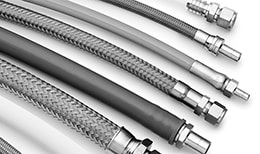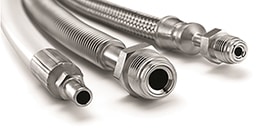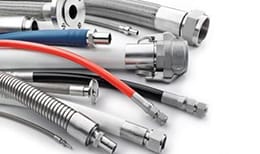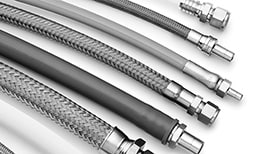
Шланг Swagelok ® серии F с тефлоновой центральной трубкой и гладким каналом
Серия F – это неметаллические шланги с тефлоновой центральной трубкой и гладким каналом, используемые как правило там, где требуется гибкость, химическая совместимость и непроводящая оплетка.
Запросить дополнительную информациюСерия F представляет собой неметаллический шланг с центральной тефлоновой трубкой, гладким каналом и волокнистой оплеткой, приклеенной запатентованным методом для защиты от перекручивания. Данный тип шланга часто используют в тех случаях, когда необходима гибкость, химическая совместимость и непроводящая оплетка.
Диаметр 1/4–3/4", рабочее давление от вакуума до 800 psig (55,1 бар ман), и широкий спектр торцевых соединений позволяют шлангам серии F удовлетворять потребности самых разных систем. Для систем, требующих рассеяния статического электричества, предлагается дополнительная центральная трубка из тефлона, наполненная техническим углеродом. Заказные комплектации могут быть дополнены другими вариантами, включая оболочки и этикетки для шлангов.
Все шланги Swagelok серии F испытываются водой в течение 30 секунд на предмет отсутствия обнаруживаемой утечки при комнатной температуре. Испытание проводится под давлением 500 psig (34,4 бар ман) или 225 psig (15,5 бар ман), если торцевое соединение рассчитано на работу под давлением менее 500 psig (34,4 бар ман).
Технические характеристики
| Материалы | Центральная трубка: Тефлон Армирование: волокнистая оплетка Торцевые соединения: Нерж. сталь 316 |
| Номинальные размеры шланга | от 1/4 до 3/4 дюйма |
| Рабочее давление | От вакуума до 800 psig (55,1 бар ман) |
| Диапазон температур | от –65 до 450°F (от –53 до 230°C) |
| Торцевые соединения | Трубные фитинги Swagelok; трубные переходники Swagelok; внутренняя трубная резьба, NPT, с муфтой JIC (AN) 37°; наружная трубная резьба, NPT, с муфтой JIC (AN) 37°; колена 90° Kwik-Clamp для биофармацевтики; колена 45° Kwik-Clamp для биофармацевтики; трубные стыковые швы; фитинги с приемным шарнирным соединением SAE 37 °(JIC); муфта с замком-фиксатором; штуцер с замком-фиксатором; патрубки из обоженного металла; фитинги торцевого кольцевого уплотнения VCO ®с внутр. резьбой; фитинги торцевого уплотнения VCR® с металлической прокладкой и внутр. резьбой; санитарно-технические зажимы серии TS; наружная трубная резьба, конус ISO/BSP (ISO 7); наружная ISO/BSP паралелльная резьба с наружным конусом 60° (ISO 228); внутренняя трубная резьба, конус ISO/BSP (ISO 7); внутренняя ISO/BSP паралелльная резьба (ISO 228); приемное шарнирное соединение ISO/BSP паралелльная резьба с конусом 30°; приемное шарнирное соединение ISO/BSP паралелльная резьба с конусом 60°; соединение для биофармацевтики JIS(A)/ISO, тип 2852; вакуумный фланец ISO-KF; соединение для биофармацевтики DIN 11864-3, серия A, форма А, обжимное кольцо под хомут с канавкой; внутр. DIN 11851 с гайкой; фланец для соединения внахлест ASME, класс 150; фланец для соединения внахлест JIS 10K; фланец для соединения внахлест DIN PN10; вставное соединение для биофармацевтики I-Line; применое соединение для биофармацевтики I-Line; DIN 32676; и ISO 2852 |
Каталоги шлангов и гибких трубок
Получите подробные сведения о продукции, в том числе о материалах изготовления, номинальных параметрах давления и температуры, вариантах исполнения и вспомогательных принадлежностях.
Swagelok® hose and tubing products are available in custom lengths, in diameters 2 inches and under, and with many types of end connections, core materials, and reinforcement styles to suit a broad spectrum of pressures and temperatures.

Сервисы по обследованию шлангов Swagelok®
Узнайте, как улучшить выбор шлангов, их монтаж, процедуры осмотра и техобслуживания с целью увеличения срока службы, улучшения рабочих характеристики, а также снижения сопутствующих затрат.
Узнайте об управлении состоянием шланговスウェージロックのリソース

ホースの安全性確保とプラント・コスト低減のための3つのステップ
プラントの定期メンテナンスでは、一般産業用ホースは軽視されがちです。 しかし、ホースには相応の注意を払う必要があります。ホースに漏れや摩耗が生じると、設備が危険に曝されるおそれがあるからです。 今回は、ホースの不具合による危険な状況を回避し、プラント・コストを低減するためのヒントを紹介します。

一般産業用ホースのメンテナンス計画を策定してプラントのコストを大幅に削減する
一般産業用ホースの適切な交換時期を見極めることができれば、プラントのメンテナンス費用を大幅に削減することができます。今回は、システムの評価とメンテナンス計画の策定を通じて、ホースの交換サイクルを管理する方法を紹介します。

一般産業用ホースの交換: コア・チューブの材質に関する検討事項
一般産業用ホースを選定する際は、最初にホースの最も内側の層にあるコア・チューブを選んでください。 今回は、コア・チューブの材質と内面構造に基づいてアプリケーションに最適なホースを選定する方法を紹介します。

適切なホース補強材の選定方法
産業用ホースの寿命やパフォーマンスは、使用している補強材次第であると言っても過言ではありません。今回はさまざまな流体システムの用途に適した補強材のタイプについて紹介します。
